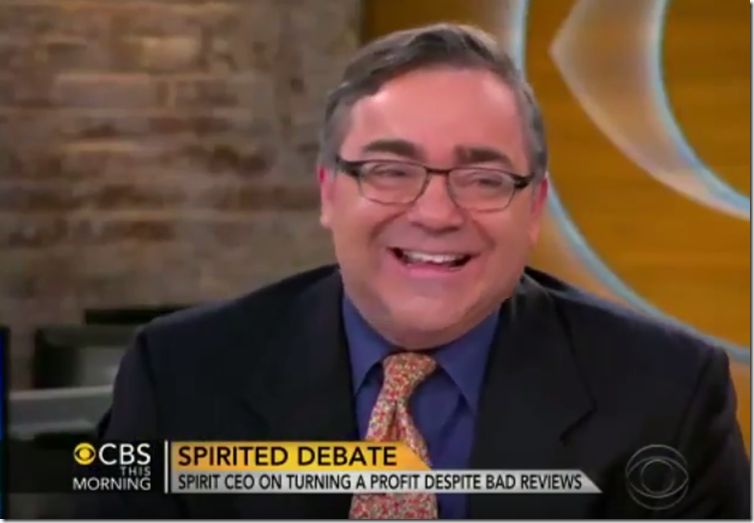How To Win When You’re Ranked Dead Last
I often get emails from readers saying something like this: “I know you post a lot of media disasters. Do you have a good example of a spokesperson doing things right?”
We’ve posted many good interviews through the years—but since there’s such interest in the topic, I wanted to post one of my favorites, a May 2013 interview with Spirit Airlines CEO Ben Baldanza.
At the time, his airline had been ranked last in customer satisfaction by Consumer Reports. Few executives want to go on television to defend such a dismal ranking—but Baldanza appeared energized by the challenge.
Here’s the clip, followed by five things Baldanza did well.
1. He Was On Message
According to the old saying, the three most important things in real estate are location, location, location. Baldanza was equally clear in his messaging regarding what matters to his customers: price, price, price. It’s clear that he knows his target audience—travelers who are willing to put up with the indignities of travel in exchange for saving money.
Just check out his first three answers, in which he mentions price (or fares) seven times.
Charlie Rose, CBS This Morning anchor: So when you know that you’re at the bottom of the list, do you simply say to them, ‘I don’t care, my planes are full?’
Ben Baldanza, Spirit Airlines CEO: Well, what we say is that we care about what our customers care about, which is price, and one of the things that Consumer Reports survey didn’t ask is where do you get the lowest fare? And so they asked about leg room, and they asked about check-in, and they asked about bag fees, and things like that. But the total price that customers pay on Spirit Airlines is less than they pay on anyone else, and that’s why they love us.
Rose: But does that mean that you can’t have customer service and low price?
Baldanza: We do have great customer service because we give them the lowest price possible.
Rose: Well, obviously not in terms of what they say in this survey.
Baldanza: Well again, if you’re measuring the physical distance between you and the seat in front of you, our seats are tighter than the other guy. But customers care about price, and we allow customers to travel for a lower price than they can otherwise travel.
2. He Was a Happy Warrior
Many CEOs whose companies earned a dismal ranking would have carried themselves like Winnie-the-Pooh’s ever-defeated Eeyore. Instead, everything about Baldanza’s demeanor conveyed the opposite—a palpable sense of joy—and an eagerness to talk to any comer about the airline he so clearly believes in. His warm humor also helped create a bit of cognitive dissonance for viewers: Wait, he was ranked the worst, but he seems totally relaxed. Maybe they’re better than I’ve heard!
3. He Conceded The Obvious
When co-host Gayle King asked him why he couldn’t offer more amenities to travelers, Baldanza was humorously dismissive. Rather than offering a business-speak answer loaded with details of Spirit’s pricing model, he reverted to plain speak—and, once again, returned to message.
Gayle King, CBS This Morning anchor: But because you’re rated so low, does it make you think, ‘Maybe we can give people some peanuts. Maybe we can give them a bottle of water.’ Do you think about that?
Baldanza: Do you think a bag of peanuts or a bottle of water is going to make you feel better about sitting in a tighter seat?
King: No.
Baldanza: What makes people come to the Spirit Airlines is that our average fare in the first quarter was $75.
4. He Delivered a Credible Message
Baldanza owned the ranking but reset its context within a winning frame. That’s no easy feat—but as the quote below shows, his airline’s success in multiple metrics are difficult to argue against.
Baldanza: Let’s talk about the lists that are important. You’re saying bottom of the list. But we’re number one in margin performance for our investors. We’re growing faster than any other airline in the US, so we’re employing more people. We’re the lowest fare in the industry, so we’re number one in the things that matter most to our employees, our customers, and our shareholders.
5. He Showed Up
Finally, Baldanza got credit just for showing up. As Gayle King noted, “Ben, I got to hand it to you for being here. Because most CEOs in your position, if they had been rated bottom of the list, they wouldn’t say, ‘Let’s go on CBS This Morning.’ Most of them would say, ‘I have a pedicure.’
Put Your Personal Feelings Aside…
I’ve shown this clip during several media trainings, and have learned that many people have strong feelings (mostly negative) about Spirit Airlines. That can make it difficult for the points made above to resonate—our trainees are so focused on a bad travel experience that they have a tough time giving Baldanza credit for his interviewing skills.
But if your business model is working—and you’re focused on maintaining your status as the low-cost (but no-frills) airline—I’m not sure he could have done much better. In fact, I’d say he stole victory from the jaws of defeat.
The Media Training Bible will help you steal victory from the jaws of defeat. Read a free excerpt below.


Several years ago, I flew on Spirit because the price was so low, unaware that the seats didn’t recline and were close together. It was a bad experience. But I have to admit, this video gives me a new respect for Spirit. Bravo, Ben Baldanza.
Thanks for reading and commenting, Joan.
I agree with you completely, and have respect for a CEO who owns the customer experience by admitting that while they don’t have many perks, they’ll do the job of getting people where they need to go for a lower price. That screens out their potential customer pool, to be sure, but those who choose to fly with Spirit have a clear sense of what their ticket entitles them to (or doesn’t).
Best,
Brad
If you’re a knowledgeable buyer and you know you’re getting the lowest fair, you pretty much have to put your complaints about comfort and amenities off to the side. What grinds many consumers is the unpleasantness of air travel on top of it being costly. BTW, I wish no airline seats reclined. The guy in front of me is taking away my space when he reclines his seat. This is all somewhat off message from a PR discussion standpoint, but it speaks to the importance of making your promise match your product and your responsibility as a consumer to understanding that balance.